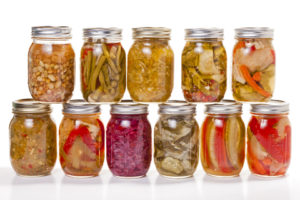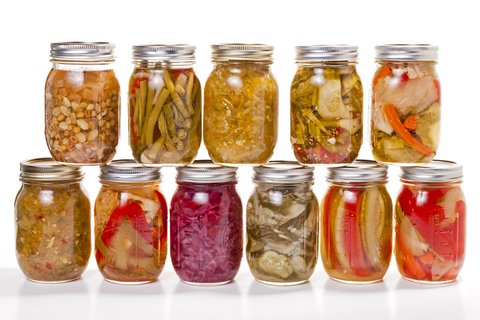
It may seem strange to us that, in earlier times, people knew how to preserve vegetables for long periods without the use of freezers or canning machines. This was done through the process of lacto-fermentation. Lactic acid is a natural preservative that inhibits putrefying bacteria. Starches and sugars in vegetables, fruits and milk are converted into lactic acid by the many species of lactic-acid-producing bacteria. These lactobacilli are ubiquitous, present on the surface of all living things and especially numerous on leaves and roots of plants growing in or near the ground.
There are many health benefits derived from eating fermented foods. They can also help to reduce high cholesterol levels in our blood, and strengthen and support our digestive and immune systems because they contain enzymes and natural antibiotics— thereby helping our bodies to fight off and prevent diseases, like cancer.
Their main by-product, lactic acid, not only keeps foods in a state of perfect preservation but also promotes the growth of healthy flora throughout the intestine, called probiotics.
Fermenting foods increases vitamin levels, and also make the nutrients in the food more available to the body. Fermented products are a great source of amino acids which create proteins in the body. Fermented milk is a great source of B vitamins while fermented vegetables are a great source of Vitamin C. Sauerkraut often served as military rations in ancient armies, and was used to prevent scurvy.
There are a variety of different fermented foods available to supplement our daily diet.
Yogurt and Kefir are made from fermented milk. Sauerkraut is made by pounding shredded cabbage to release the juices and then adding a brine to start the fermentation processe. Cucumbers, beets and turnips are also traditional foods made by lacto-fermentation. Kombucha tea is made by fermenting tea leaves with a type of fungus, which promotes healthy probiotics in the tea.
Fermentation is an inconsistent process, and some consider it more of an art than a science. Because of this, commercial food processors ignore the health benefits available to us from these fermented foods, because they involve more time and labor. Instead, they have developed techniques to help “standardize” or provide more consistent outcomes in the form of food products and supplements. Therefore, commercially produced sauerkraut and pickles do not usually hold the health benefits of making your own fermented foods at home.

